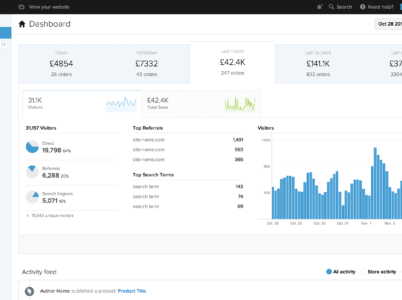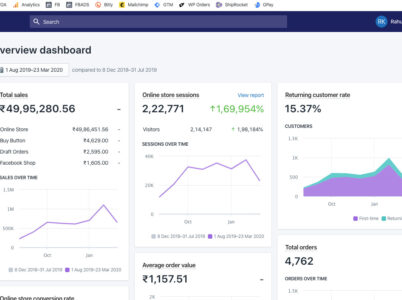AShop is a cutting-edge payment processor software specialising in providing businesses with a comprehensive eCommerce platform. It offers various tools and features to help merchants establish and manage their online stores effectively. AShop is available to simplify the complexities of eCommerce and empower businesses to succeed in the competitive digital marketplace.

With Shopify, consumers can select from an assortment of customizable templates and themes to build a visually appealing storefront. They can further use Shopify’s powerful tools to control their product listings, track sales, and consider customer behaviour.
Additionally, Shopify determines consumers with access to a strong app store that approves them to include extra features and functionality in their stores. Customers can also take advantage of Shopify’s built-in marketing tools to promote their stores and attract more consumers.
- Storefront customization: Shopify presents a sort of customizable templates and themes to help customers form a visually appealing storefront that matches their brand.
- Product management: Shopify's product management tools authorize consumers to smoothly include, edit, and systematize their product listings.
- Payment processing: Shopify suggests a secure payment processing system that supports an expansive range of payment methods, containing credit cards, PayPal, and Apple Pay.
- Shipping and fulfillment: Shopify supplies consumers with accompanying tools to control shipping rates, print shipping labels, and path packages.
- Inventory management: Shopify's inventory management tools approve consumers to path their inventory levels, set up stock alerts, and control their product variants.
- WooCommerce: WooCommerce is an open-source e-commerce plugin for WordPress that authorizes users to form and control online stores.
- BigCommerce: BigCommerce is a cloud-based e-commerce platform that presents an off-course range of features for online store management.
- Magento: Magento is an effective e-commerce platform that proposes a high level of customization and scalability for trades of all sizes.
- Wix: Wix is a site builder that contains e-commerce functionality, approving consumers to form and control online stores.
- Squarespace: Squarespace is a site builder that further contains e-commerce functionality, offering a streamlined approach to online store creation and management.
- Retailers create and control their online stores, selling a variety of products like clothing, electronics, and home goods.
- Service providers like consultants and freelancers, use Shopify to sell digital products like eBooks and courses.
- Artists and creatives, containing photographers and designers, use Shopify to sell their work online, containing prints, digital downloads, and custom products.
- Non-profits sell merchandise, accept donations, and raise funds for their causes.
- BasicPlan
This plan is for everything you need to create your store, ship products, and process payments with a monthly subscription price of ₹1,499/month billed yearly.
- ShopifyPlan
This plan is for levelling up your business with professional reporting and more staff accounts with a monthly subscription price ₹5,599.00/month billed yearly.
- AdvancedPlan
This plan gives the best of Shopify with custom reporting and our lowest transaction fees with a monthly subscription price ₹22,680.00/month billed yearly.
Shopify presents an expansive range of customizable themes for online stores, with choices for design, layout, and functionality. Customers can further personalize their themes with HTML, CSS, and JavaScript, or use Shopify’s built-in customization choices to include custom logos, colours, fonts, and more.
Shopify SEO optimization for higher search ranking
To increase SEO on a Shopify store, consumers can optimize page titles and descriptions, include relevant keywords to product descriptions, form a blog for regular content, upgrade page load speed, and use backlinks and social media to develop visibility and traffic. Shopify further proposes built-in SEO tools to help optimize stores.
Shopify payment gateway integration for secure transactions
Shopify suggests an assortment of secure payment gateway integrations for online stores, containing Shopify Payments, PayPal, and Stripe. Shopify Payments is an all-in-one payment solution that authorizes consumers to accept credit cards and other payment methods precisely through their stores, with no additional transaction fees.
Shopify app and plugin integration for added functionality
Shopify offers an off-course range of apps and plugins to help consumers add additional functionality to their stores, like email marketing, social media integrations, drop shipping, and inventory management. These apps and plugins may be easily be integrated with Shopify stores, providing users accompanying a more smooth and more integrated experience.
Shopify multilingual and multicurrency support
Shopify presents multilingual support using translation apps, that authorize consumers to translate their store’s content into multiple languages. Shopify further supports multicurrency payments, approving consumers to accept payments in different currencies and display prices in the currency of the customer’s choice.
Shopify order management and fulfilment process
Shopify determines an assortment of tools for executing orders and accomplishing customer requests. Customers can path inventory, process orders, print shipping labels, and provide clients accompanying real-time shipping updates. Shopify also integrates with a difference of third-party shipping and fulfillment providers to organize the order accomplishment process.
Shopify B2B e-commerce solutions for wholesale businesses
Shopify proposes a variety of B2B e-commerce solutions for wholesale trades, containing wholesale costing and bulk ordering choices, custom catalogues and costing for different client groups, and private app development for custom integrations. Shopify likewise offers integrations accompanying popular B2B e-commerce platforms, like Handshake and NuORDER.

Shopify is a prominent e-commerce platform that empowers individuals and businesses to create and operate online stores. It offers a wide array of features and services to assist users in establishing their online presence, managing their inventory, processing payments, and handling shipping and fulfillment.
Through Shopify, users can choose from a diverse selection of customizable templates and themes to create a visually appealing storefront. They can also utilize Shopify's robust tools to manage their product listings, track sales, and analyze customer behavior.
- Pricing: Shopify’s costing plans are slightly higher than Volusion’s, but Shopify presents more features and adaptability for the price.
- Ease of use: Shopify is popular for its convenient interface and smooth setup process, while Volusion has a steeper learning curve.
- Design and customization: Shopify allows more themes and customization choices, while Volusion’s design choices are more restricted.
- Integrations: Shopify has the best number of integrations and third-party apps available than Volusion.
Shopify Vs Wix
- E-commerce focus: Shopify is generally focused on e-commerce and specifies a stronger set of e-commerce features, while Wix presents e-commerce as just one of many features.
- Customization: While both platforms propose customization choices, Shopify is more adaptable and suggests a more off-course range of customization options, specifically for e-commerce-particular features like checkout and payment choices.
- Pricing: Shopify’s costing plans are mainly higher than Wix’s, but Shopify offers more progressive features and functionality for the price.
- Integrations: Shopify has a larger number of integrations and third-party apps available than Wix.
Shopify Vs SquareSpace
- E-commerce focus: Shopify is generally focused on e-commerce and supports a stronger set of e-commerce features, while Squarespace suggests e-commerce as just one of many features.
- Customization: Squarespace proposes more design customization choices, while Shopify is more adaptable and offers a more off-course range of customization alternatives, specifically for e-commerce-particular features like checkout and payment options.
- Pricing: Shopify’s costing plans are mainly above Squarespace’s, but Shopify offers more progressive features and functionality for the price.
- Integrations: Shopify has a larger number of integrations and third-party apps available than Squarespace.
Zen Cart is an open-source e-commerce platform that enables users to create online stores with ease. It offers an extensive range of features, including product management, order management, shipping and payment integration, and customer management. Zen Cart is highly customizable and can be tailored to fit the specific needs of a business. It provides a user-friendly interface, making it accessible even for those with little or no experience in web development.
Zepo is an e-commerce platform designed to assist small businesses in India in establishing and operating their online stores. Founded in 2011, Zepo offers a variety of features and services to support businesses in selling their products online. These include website design and development, payment gateway integration, inventory management, and marketing tools.






